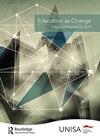用语义路径揭示职前教师反思的“深度”
IF 1
4区 教育学
Q3 EDUCATION & EDUCATIONAL RESEARCH
引用次数: 2
摘要
在教师培训项目中,职前教师需要对他们的课堂经验进行有意义的反思。然而,一些职前教师倾向于提供课堂事件和互动的叙述。导师和评估人员敦促他们“更深入地探索”,但对这需要做些什么却几乎没有给出指导。本研究报告了一项干预,在注意到指导方针如何提出限制专业学习的问题后,改变了反思指导方针。修订后的指导方针促使职前教师将从课程中获得的理论见解与他们在课堂上的体验式学习联系起来。合法性法典理论的语义维度用于比较针对原始和修订后的准则所写的反思。使用修订后的指导方针,三分之二的参与者更有意地利用理论见解来解释和解释他们的课堂经历。文章最后提出了几个条件,使职前教师能够写出“更深层次”的反思,这些反思既有理论依据,又有背景反应。这些条件包括获得相关的概念,使期望可见的指导方针,以及获得提供关于“深入探索”的反馈的实践语言。我认为合法性法典理论的概念提供了这样一种语言。本文章由计算机程序翻译,如有差异,请以英文原文为准。
Using Semantic Pathways to Reveal the “Depth” of Pre-Service Teachers’ Reflections
During teacher preparation programmes, pre-service teachers need to reflect meaningfully on their classroom experiences. However, some pre-service teachers tend to provide narrative accounts of classroom events and interactions. Mentors and assessors urge them to “probe more deeply” but give little guidance about what this entails. This study reports on an intervention in which reflection guidelines were changed after noticing how guidelines asked questions that limited professional learning. The revised set of guidelines prompted pre-service teachers to make iterative links between the theoretical insights gleaned from coursework and their experiential learning in classroom settings. The Semantics dimension from Legitimation Code Theory is used to compare the reflections written in response to the original and revised guidelines. Using the revised guidelines, two thirds of participants drew more intentionally on theoretical insights to interpret and explain their classroom experiences. The article concludes by suggesting several conditions for enabling pre-service teachers to write “deeper” reflections that are both theoretically informed and contextually responsive. These conditions include access to relevant concepts, guidelines that make expectations visible and access to a language of practice for providing feedback about what “probing more deeply” looks like. I argue that the concepts from Legitimation Code Theory offer such a language.
求助全文
通过发布文献求助,成功后即可免费获取论文全文。
去求助
来源期刊

Education As Change
EDUCATION & EDUCATIONAL RESEARCH-
CiteScore
1.40
自引率
0.00%
发文量
29
审稿时长
24 weeks
期刊介绍:
Education as Change is an accredited, peer reviewed scholarly online journal that publishes original articles reflecting critically on issues of equality in education and on the ways in which educational practices contribute to transformation in non-formal, formal and informal contexts. Critique, mainly understood in the tradition of critical pedagogies, is a constructive process which contributes towards a better world. Contributions from and about marginalised communities and from different knowledge traditions are encouraged. The articles could draw on any rigorous research methodology, as well as transdisciplinary approaches. Research of a very specialised or technical nature should be framed within relevant discourses. While specialised kinds of research are encouraged, authors are expected to write for a broader audience of educational researchers and practitioners without losing conceptual and theoretical depth and rigour. All sectors of education are covered in the journal. These include primary, secondary and tertiary education, adult education, worker education, educational policy and teacher education.
 求助内容:
求助内容: 应助结果提醒方式:
应助结果提醒方式:


